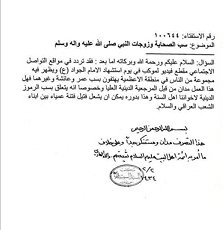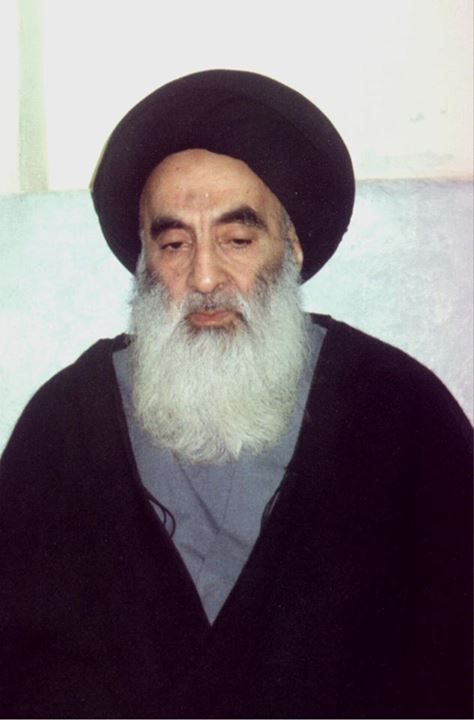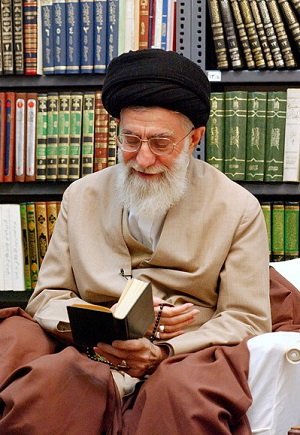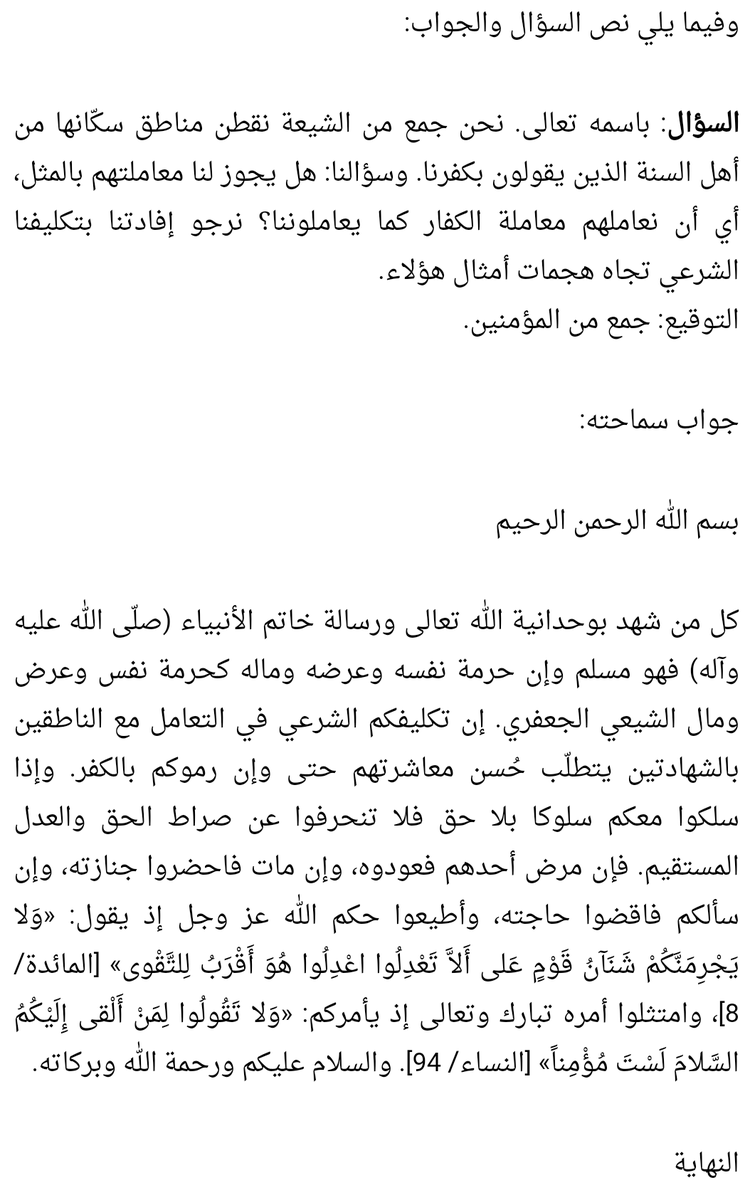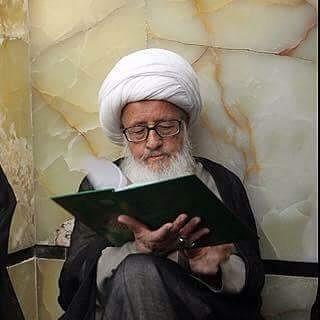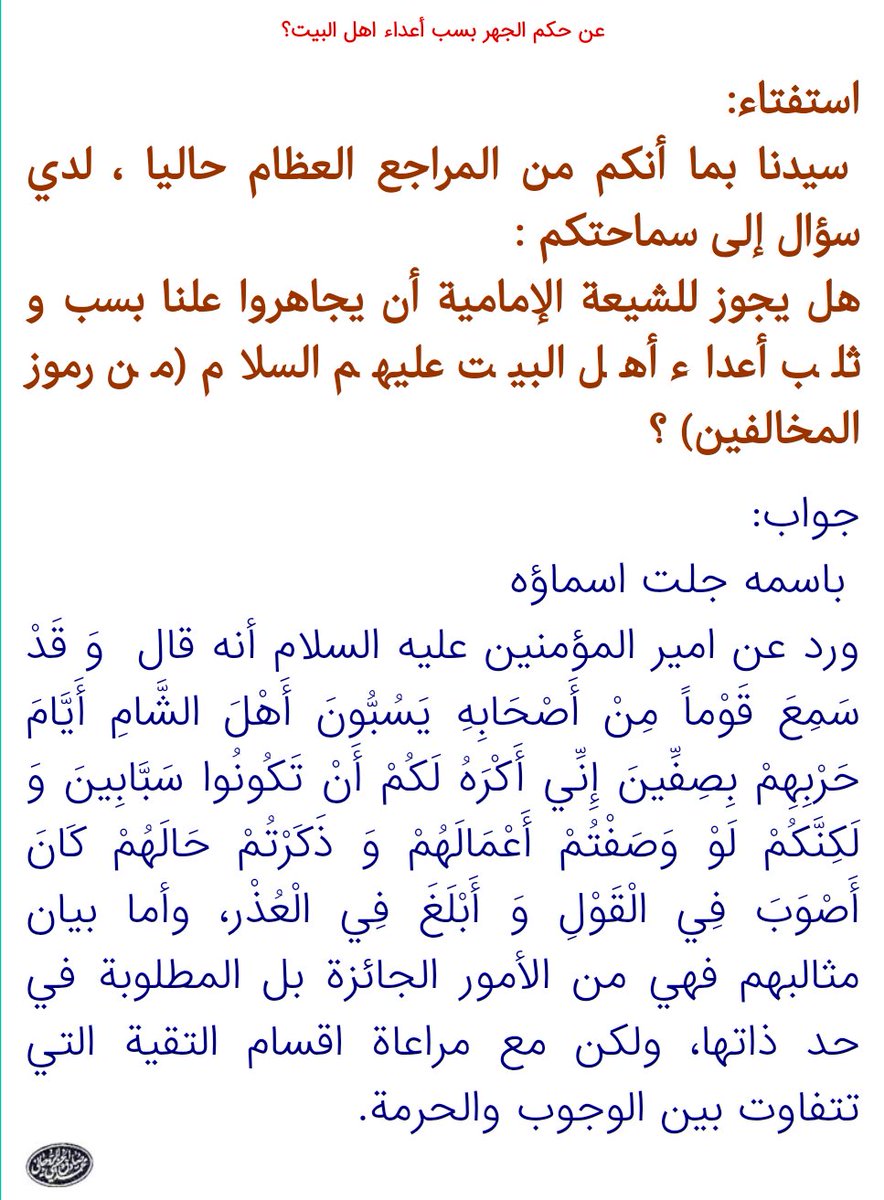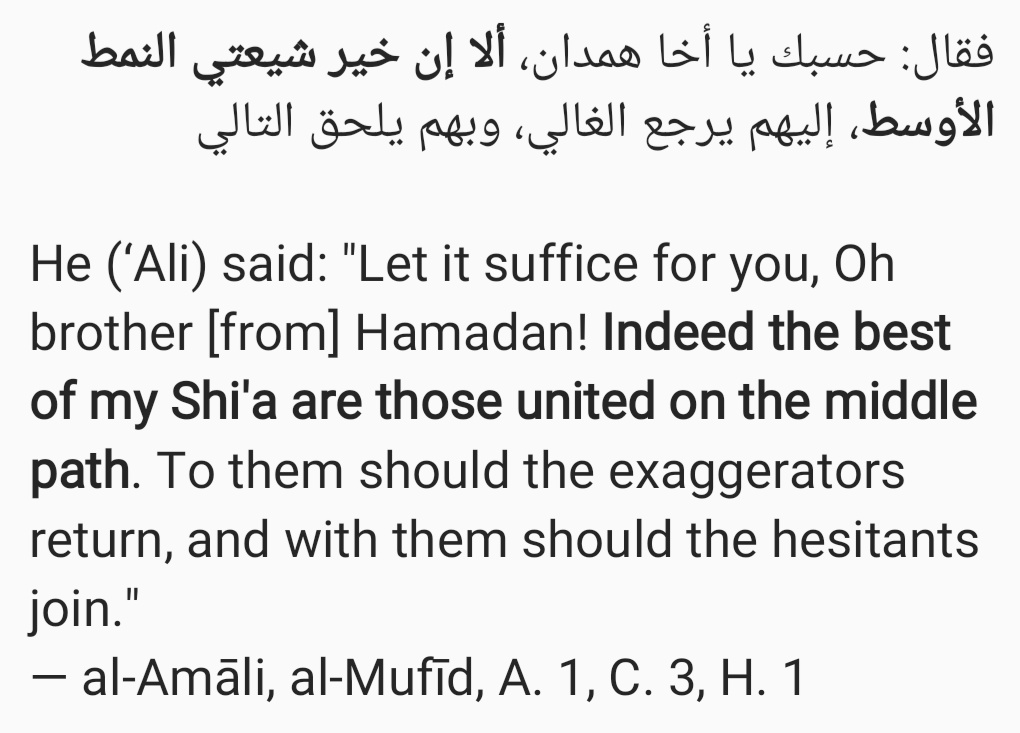[THREAD - La& #39;nah and Sabb. Do they have a basis in our religion, and should it be done publically or privately?]
Firstly, let& #39;s define what these two words mean.
"al-La& #39;an" = a prayer for Allah (swt) to remove his mercy from an individual or group.
"al-Sabb" = using insulting / disrespectful language to describe a negative attribute[s] of an individual which they may possess.
"al-La& #39;an" = a prayer for Allah (swt) to remove his mercy from an individual or group.
"al-Sabb" = using insulting / disrespectful language to describe a negative attribute[s] of an individual which they may possess.
Before quoting examples of these from the literature - I want to mention that there are those from the Shi& #39;a scholarship who disagree with the use of & #39;al-Sabb& #39; entirely, however I will be discussing this from the mainstream view who do accept that it is a part of our religion.
There are examples of La& #39;nah in the Qur& #39;an. We find that Allah (swt) has sent his La& #39;nah on many different categories of people.
Based on this, we send La& #39;nah on individuals who we believe [because our Imams (as) told us] they fit these categories, I& #39;ll mention a few places:
Based on this, we send La& #39;nah on individuals who we believe [because our Imams (as) told us] they fit these categories, I& #39;ll mention a few places:
ألا لعنة الله على الظالمين
".. Indeed the damnation of Allah (swt) is upon the oppressors." [11:8]
لعنة الله على الكاذبين
".. the damnation of Allah (swt) upon the liars." [3:61]
".. Indeed the damnation of Allah (swt) is upon the oppressors." [11:8]
لعنة الله على الكاذبين
".. the damnation of Allah (swt) upon the liars." [3:61]
وعد الله المنافقين والمنافقات والكفار نار جهنم خالدين فيها هي حسبهم ولعنهم الله
"Allah has promised the hypocrite men, and hypocrite women and the disbelievers the fire of Hell, wherein they will abide eternally. It is sufficient for them, and Allah has damned them." [9:68]
"Allah has promised the hypocrite men, and hypocrite women and the disbelievers the fire of Hell, wherein they will abide eternally. It is sufficient for them, and Allah has damned them." [9:68]
Likewise there are examples of Allah (swt) using Sabb in the Qur& #39;an, where there is insulting words used to describe an individual or a people. There are also arguably many examples, but again I will only mention a few for an overview:
مَثَلُ الَّذِينَ حُمِّلُوا التَّوْرَاةَ ثُمَّ لَمْ يَحْمِلُوهَا كَمَثَلِ الْحِمَارِ يَحْمِلُ أَسْفَارًا
"The example of those who were entrusted with the Torah and then did not take it on is like that of a donkey who carries volumes [of books]." [62:5]
"The example of those who were entrusted with the Torah and then did not take it on is like that of a donkey who carries volumes [of books]." [62:5]
عُتُلٍّ بَعْدَ ذَٰلِكَ زَنِيمٍ
"Cruel, [and] after all that base-born (of illegitimate birth)" [68:13]
إِنْ هُمْ إِلَّا كَالْأَنْعَامِ ۖ بَلْ هُمْ أَضَلُّ سَبِيلًا
"They are not except like cattle. Rather, they are [even] more astray in [their] way." [25:44]
"Cruel, [and] after all that base-born (of illegitimate birth)" [68:13]
إِنْ هُمْ إِلَّا كَالْأَنْعَامِ ۖ بَلْ هُمْ أَضَلُّ سَبِيلًا
"They are not except like cattle. Rather, they are [even] more astray in [their] way." [25:44]
Some people may have objections to this, which I want to address very briefly:
1. Is this not against Akhlāq (manners)?
2. The fact that it is Allah (swt) gives him the right to speak in that way, not us?
3. Can we find this in the narrations of the Imams?
1. Is this not against Akhlāq (manners)?
2. The fact that it is Allah (swt) gives him the right to speak in that way, not us?
3. Can we find this in the narrations of the Imams?
1. Akhlāq and good morals are defined and explained by Allah (swt) and his Messenger (sawa).
When the Messenger (sawa) says/does something, that thing becomes good Akhlāq - he is the gauge for that, and not necessarily what we think may be good or bad behaviour ourselves.
When the Messenger (sawa) says/does something, that thing becomes good Akhlāq - he is the gauge for that, and not necessarily what we think may be good or bad behaviour ourselves.
2. Allah (swt) mentions in the Qur& #39;an & #39;those who curse& #39; alongside Himself:
"they are those whom Allah (swt) has damned, and cursed by those who curse." [2:159]
And the Qur& #39;an is read to the general people by Muslims - along with the Sabb in Surah Jum& #39;ah every Friday!
"they are those whom Allah (swt) has damned, and cursed by those who curse." [2:159]
And the Qur& #39;an is read to the general people by Muslims - along with the Sabb in Surah Jum& #39;ah every Friday!
3. Yes, we do find this concept in the narrations of the Imams (as) but with some contexts, and some understandings that need to be paid attention to.
This will be the main part of my discussion, and how we can come to a holistic understanding and balance in the narrations.
This will be the main part of my discussion, and how we can come to a holistic understanding and balance in the narrations.
To also firstly establish a foundation in terms of how we should be aiming to call towards the Ahl al-Bait (as) and by extension al-Islam in general; the foundation should be wisdom and good instruction as Allah (swt) says in His Book:
ادْعُ إِلَىٰ سَبِيلِ رَبِّكَ بِالْحِكْمَةِ وَالْمَوْعِظَةِ الْحَسَنَةِ ۖ وَجَادِلْهُم بِالَّتِي هِيَ أَحْسَنُ
"Invite to the way of your Lord with wisdom and good instruction, and argue with them in a way that is best." [16:125]
"Invite to the way of your Lord with wisdom and good instruction, and argue with them in a way that is best." [16:125]
I am now going to present a few narrations that are used to show that using insulting language is allowed when used against enemies of Allah (swt) - and explaining how these narrations can possibly be understood in the light of other narrations.
This is an excerpt from a lengthy narration in Tafsir al-Qummi, regarding the battle of Khandaq when Amr bin Abd al-Wud was challenging all the Muslims to a one-on-one duel and boasting of his bravery.
The Prophet (sawa) referred to him as a dog, because he is a clear enemy.
The Prophet (sawa) referred to him as a dog, because he is a clear enemy.
In this narration of Kumait ibn Zaid - where he is in a private gathering with the Imam (as).
The Imam (as) explains that he orders his Shi& #39;a to insult the enemies, but with no restrictions placed here - other narrations would need to be looked at to determine the boundaries.
The Imam (as) explains that he orders his Shi& #39;a to insult the enemies, but with no restrictions placed here - other narrations would need to be looked at to determine the boundaries.
In the narration of Dawud ibn Sarhān, it says "show your dissociation" which is usually extrapolated into proving public dissociation.
But it& #39;s important to note that in the rest of the narration, the emphasis and aim is on being able to warn the people from their innovations.
But it& #39;s important to note that in the rest of the narration, the emphasis and aim is on being able to warn the people from their innovations.
I believe that all societies are different having differing norms and worldviews, so what would be the best way of doing that in your society?
Ask yourself first honestly; whether you would be more attracted to a group that intentionally provoke you or who explain respectfully?
Ask yourself first honestly; whether you would be more attracted to a group that intentionally provoke you or who explain respectfully?
I believe that all societies are different and have differing norms and worldviews - where harsh approaches may work better with some societies than others - but it is upto you as an individual to make that judgement.
Let me now present the narrations showing these boundaries.
Let me now present the narrations showing these boundaries.
The concept of al-Taqiyyah al-Mudārātiyah; a form of Taqiyyah that is not to only be employed in a state of fear.
This is a lifestyle, whereby you are mindful of the understandings of the people around you - and you maintain good relations with them through your behaviour.
This is a lifestyle, whereby you are mindful of the understandings of the people around you - and you maintain good relations with them through your behaviour.
This is not to be misunderstood as lying about your belief, as the Prophet (sawa) mentioned in the narration; "without leaving the truth".
It is merely being respectful and mindful - what I would call basic social intelligence. The Prophet (sawa) describes it as "half of faith".
It is merely being respectful and mindful - what I would call basic social intelligence. The Prophet (sawa) describes it as "half of faith".
And this is a lifestyle that the Imams (as) also encouraged, narrations like the one below are in multiplicity - the Imams (as) stress heavily on not cutting ourselves out of the general Muslim identity.
As their followers, we are [poor but nonetheless] representatives of them.
As their followers, we are [poor but nonetheless] representatives of them.
To bring this back, why would you want to be the person on social media who claims to love the Ahl al-Bait (as) but is only known for his hate?
Why would you allow for your own people and the opposition to become one against you? Oh Shi& #39;i, do not cause yourself to be humiliated!
Why would you allow for your own people and the opposition to become one against you? Oh Shi& #39;i, do not cause yourself to be humiliated!
Furthermore, in your own judgement - how do you know that your Imam (as) is pleased with this?
The narration warned us as per the verse of the Qur& #39;an [6:108], if we intentionally provoke them - the same things will be said about our Imam (as) - are you pleased to be the reason?
The narration warned us as per the verse of the Qur& #39;an [6:108], if we intentionally provoke them - the same things will be said about our Imam (as) - are you pleased to be the reason?
I just also want to add, while this is a narrations based academic discussion here, putting that to one side; a lot of the time this is about peoples pride and anger.
Polemics has today become something that every angry, frustrated and egotistical teenager wants to go into, why?
Polemics has today become something that every angry, frustrated and egotistical teenager wants to go into, why?
It is very obviously as a result of the & #39;refutation culture& #39; in mainstream & #39;salafi dawah& #39;.
The very people whom these Shi& #39;a despise, and spend day and night looking for arguments to refute - are the same people that they become in the end. Do not let your emotions control you!
The very people whom these Shi& #39;a despise, and spend day and night looking for arguments to refute - are the same people that they become in the end. Do not let your emotions control you!
I want to now finally present the views of some of our scholars regarding these issues - who have the most holistic readings on the subject and have given rulings regarding this:
1. Ali al-Sistani (ha) when questioned regarding an incident in al-A& #39;dhamiyah where some Shi& #39;a went into a Sunni province and cursed the enemies of Ahl al-Bait (as) publically:
"This act is condemned, and completely rejected - and is in opposition to what the Ahl al-Bait (as) have ordered their Shi& #39;a, and Allah (swt) is the one who guides."
Stamped and dated: 2nd Dhul Hijjah 1434, Hijri
Stamped and dated: 2nd Dhul Hijjah 1434, Hijri
2. Ali Khamenei (ha) in his famous fatwa in 2010 against the insulting of the symbols of the opposing sect:
"It is not permissible to insult the symbols of our brothers from Ahl al-Sunnah, let alone the accusation against the wife of the Prophet (sawa), taking away from her honour - rather this is an impossibility for all of the wives of the Prophets"
3. Hossein Wahid Khorasani (ha) in his response to an Istiftā& #39; asking how we should act towards Muslims who may consider us disbelievers:
"Anyone who testifies by the Oneness of Allah (swt), and in the message of the Seal of the Prophets (sawa) then he is a Muslim. Hence his life, honour, property are all respected the same way the life, honour and property are respected of the one who follows the Ja& #39;fari school.
And it is an obligation upon you to try your best to live with them in good - even if they consider you a disbeliever."
Source: Shafaqna, Iraq - January 29th 2016.
Source: Shafaqna, Iraq - January 29th 2016.
4. Muhammad Sadiq Rohani (ha) when asked whether it is permissible for the Shi& #39;a to insult the enemies of Ahl al-Bait (as) publically, if they are symbols of the opposing sect:
"It has been reported from Amirul Mu& #39;mineen (as) that he said, after hearing a group of his companions insulting the people of the Levant in the days of their battle in Siffin: ‘Indeed I do not like for you to be a people who constantly curse, rather if you were to describe their
actions and mention their states it would be closer to that which is correct in speech and more eloquent in explanation.’ As for speaking about their deficiencies then this is from the matters that are permissible, rather it is required in itself - however with close
consideration of the types of al-Taqiyyah which vary in ruling between that which can be obligatory and impermissible."
Source: http://rohani.ir"> http://rohani.ir (the official website of the Marji& #39;)
Source: http://rohani.ir"> http://rohani.ir (the official website of the Marji& #39;)
After this brief examination of a few narrations on the issue and the sayings of some of our most prominent scholars on how we should live amongst the general masses and other sects - and whether we should curse the enemies publically - I& #39;d like to summarise in a few points.
1. We are aware that La& #39;nah and Sabb are both found in the literature - both in the Qur& #39;an and the ahādith of al-& #39;Itrat al-Tāhirah (as).
2. Public dissociation / insulting may have been praised, but there was emphasis on the aims of doing so which we should not lose sight of.
2. Public dissociation / insulting may have been praised, but there was emphasis on the aims of doing so which we should not lose sight of.
3. We know that the Imams (as) heavily practiced al-Taqiyyah al-Mudārātiyah and encouraged their companions to do so in general too.
4. We find a balance whereby we understand that some individuals are always deserving of our curses and insults - but there is a time and place.
4. We find a balance whereby we understand that some individuals are always deserving of our curses and insults - but there is a time and place.
5. The holistic understanding is one of wisdom; methodologies have to be measured along the social mindset for overall progression.
We should not keep our beliefs to ourselves, but we should be wise in how we address these sensitive issues as the Shi& #39;a of Ahl al-Bait (as).
We should not keep our beliefs to ourselves, but we should be wise in how we address these sensitive issues as the Shi& #39;a of Ahl al-Bait (as).

 Read on Twitter
Read on Twitter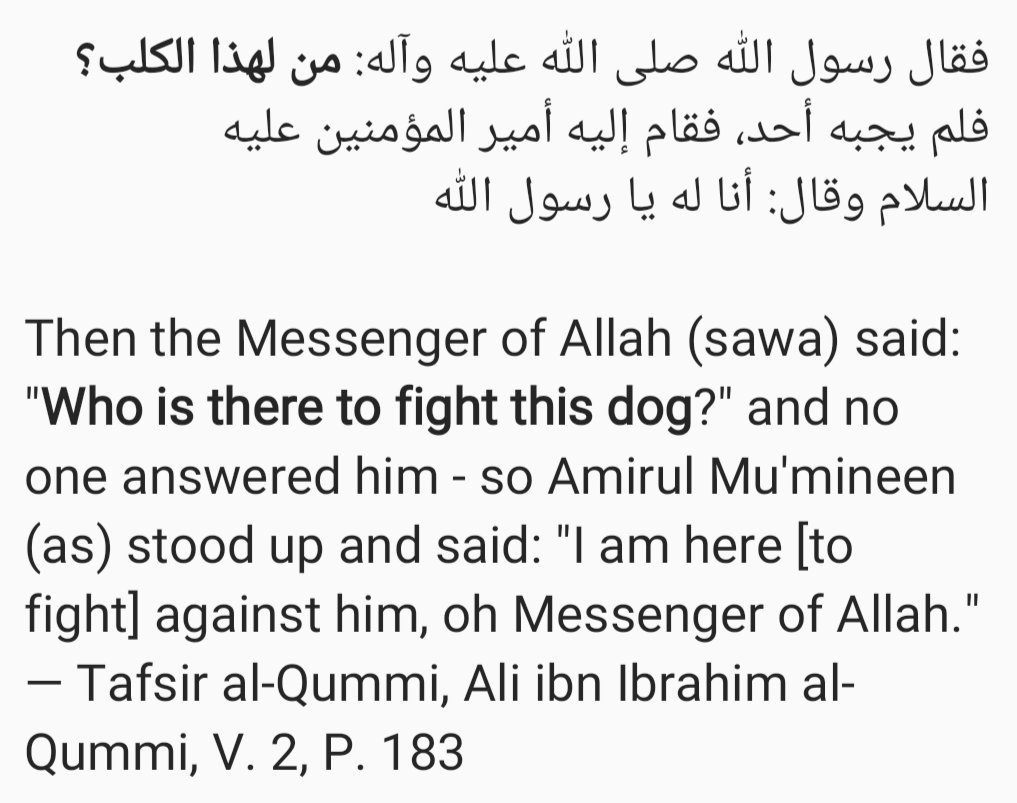
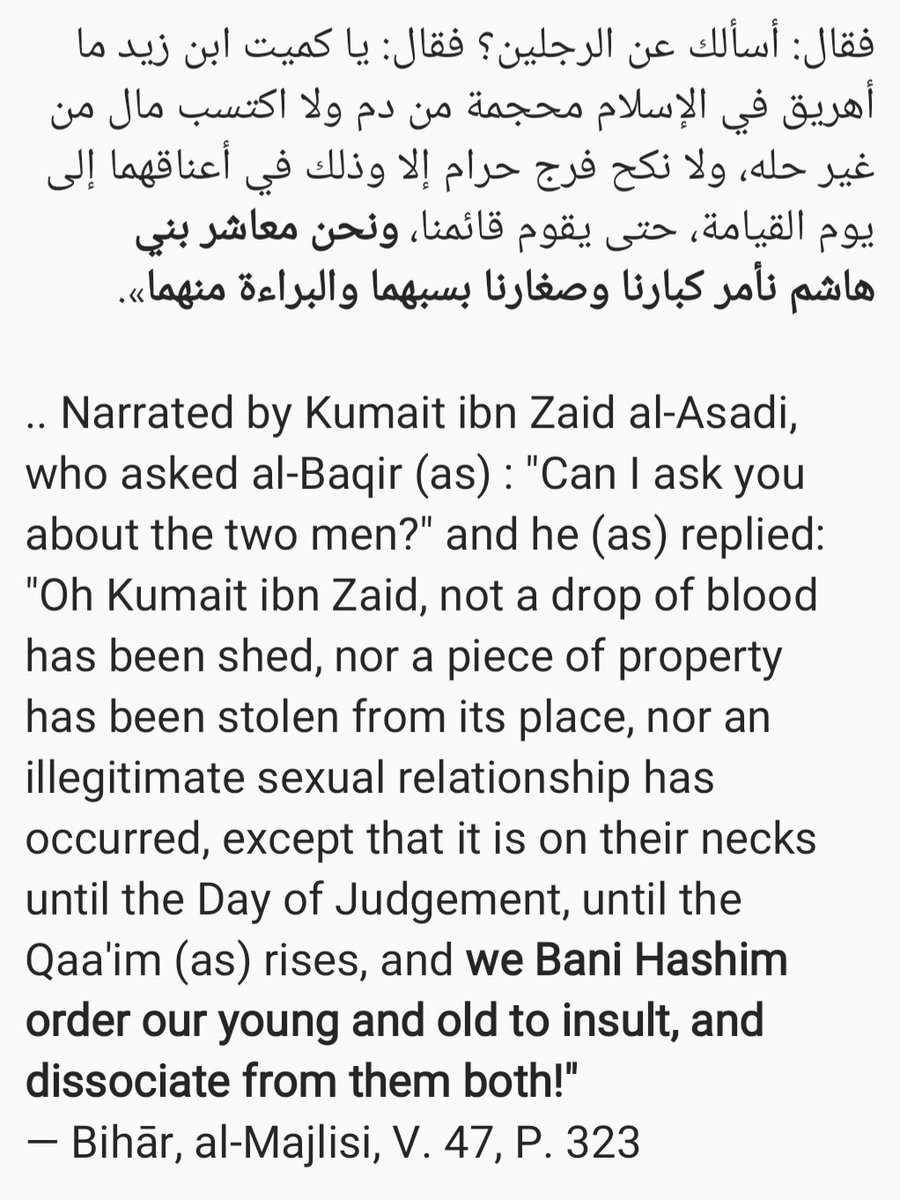

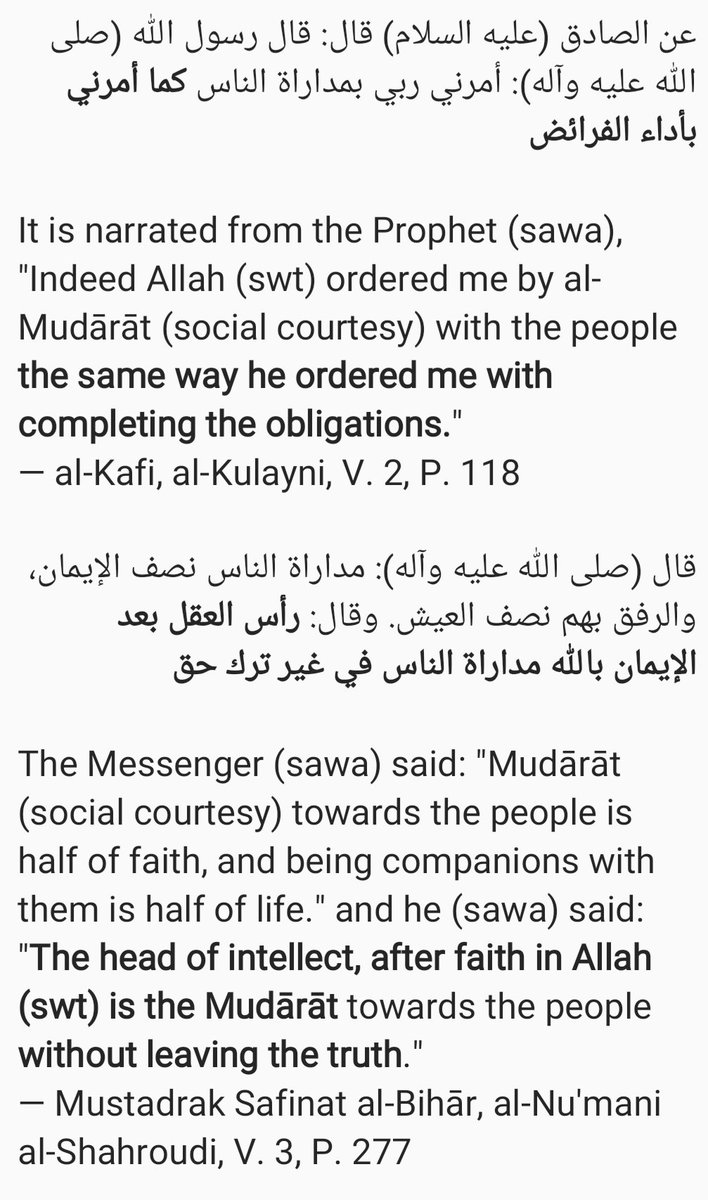
![And this is a lifestyle that the Imams (as) also encouraged, narrations like the one below are in multiplicity - the Imams (as) stress heavily on not cutting ourselves out of the general Muslim identity.As their followers, we are [poor but nonetheless] representatives of them. And this is a lifestyle that the Imams (as) also encouraged, narrations like the one below are in multiplicity - the Imams (as) stress heavily on not cutting ourselves out of the general Muslim identity.As their followers, we are [poor but nonetheless] representatives of them.](https://pbs.twimg.com/media/EbtlRr9WkAEKE_i.jpg)
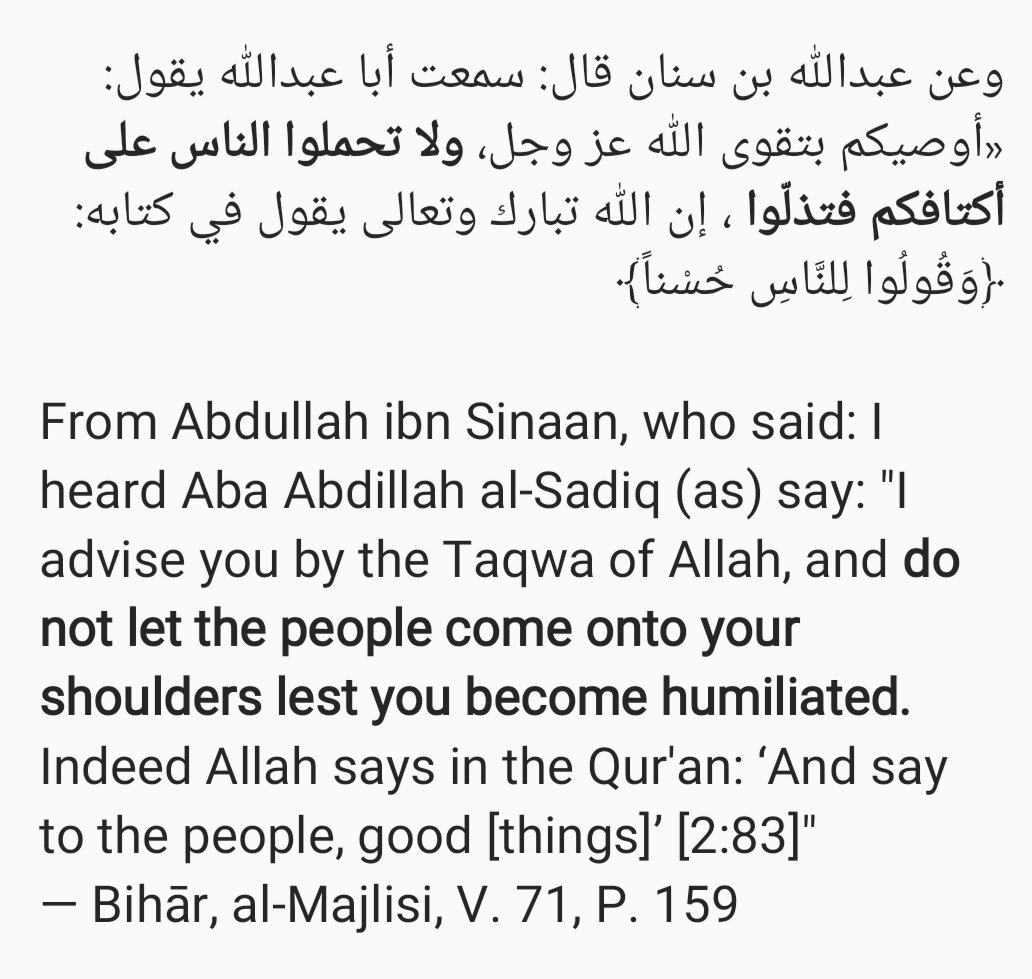
![Furthermore, in your own judgement - how do you know that your Imam (as) is pleased with this? The narration warned us as per the verse of the Qur& #39;an [6:108], if we intentionally provoke them - the same things will be said about our Imam (as) - are you pleased to be the reason? Furthermore, in your own judgement - how do you know that your Imam (as) is pleased with this? The narration warned us as per the verse of the Qur& #39;an [6:108], if we intentionally provoke them - the same things will be said about our Imam (as) - are you pleased to be the reason?](https://pbs.twimg.com/media/EbtlV7ZXQAI23z0.jpg)
